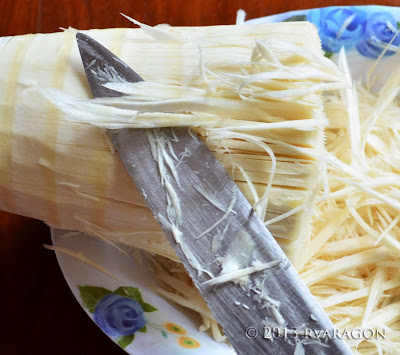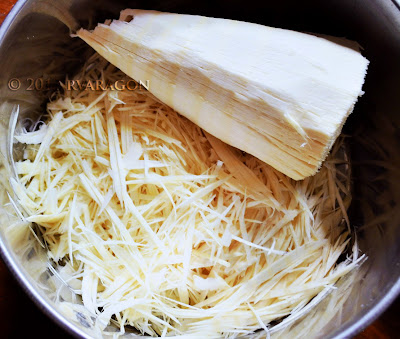 |
| Rabong salad, with bugguong and onions. |
Rabong, bamboo shoot, is a versatile veggie
dish in that it can be turned into various dishes, and foremost of it,
Ilokano-wise, is the famous dinengdeng
duo: rabong ken saluyot. The tender
bamboo bud can be made into an adobo a
rabong, ginisa a rabong, achara a rabong, ginettaan a rabong, can even be a
veggie ingredient in soups like sinigang
and lauya. And many more.
I
found this huge rabong in the public
market in Claveria, Cagayan. I forgot to take a photo of the towering shoot
before I peeled off its “bark” but this is it when I cleaned it and ready to be
cut for cooking:
This is how I simply prepare rabong, no fancy chopping or mincing, I just chop-chop-chop atop it vertically and slice it off into uneven sticks or strips. Rabong fine cutters there might frown at me with their elaborate cuts. But this is what I learned as a child when we hunt down rabong in thick and thorny bamboo thickets and prepare it this way quickly for the day’s lunch or dinner of dinengdeng or ginisa a rabong:
I just chop and chop it out and slice and slice it off, the bud getting smaller and smaller:
And it’s done:
Now, the boiling. Rabong should be boiled first to get rid of its bittery taste. Although some rabong variety are mildly bitter and sweetish and can be cooked straight into a delicious dish without boiling. Some prefer a more bittery rabong, by the way. The rabong of the bayog and kiling variety of bamboo is somewhat more bitter. This one I boiled it just for a few minutes, it’s not the more bittery variety, of which I most prefer for my my different dishes later:
The
boiled rabong. It turns yellowish
when cooked. Squeeze and rinse. I do not squeeze much my rabong, though. You
might be discarding some important essence, nutrients and all that, if you
squeeze much of its natural succulence just to get rid of its bitterness
completely, and it will become a bland rabong:
Now,
the rabong, preboiled, is ready for
your dish of choice:
What I initially prepared, for a quick fix, is the easiest and simpliest one—
This
is my favorite rabong dish, in that I
say it’s the tastiest one you can have out of a freshly cut and cooked rabong. You can be assured that you’ll
get all the rabongness that there’s
to it. I just simply dress the boiled rabong with bugguong, sliced onions, some umami (MSG; if you prefer), some
calamansi squeezes (or even some drops of can vinegar, if you prefer), toss it,
and it’s done:
This
goes so well with steaming rice, fried rice, kilabban. I usually mix in a teaspoon of cooking oil on my rice
(newly concocted coconut oil or nasinglag
a lana ti niog, is perfect for this) whenever I have a rabong salad like this and it’s a kind of guilty pleasure because I
unsconciously consume a lot rice. As an option, if you have olive oil, you can
drench some drops of it right on the rabong
salad, for that real salad kick:
Next: other dishes I prepared out of this huge
rabong. Padaanan!
:::::

























Gimasen! this is what we called pansit ilokano when we were still kids.
ReplyDelete